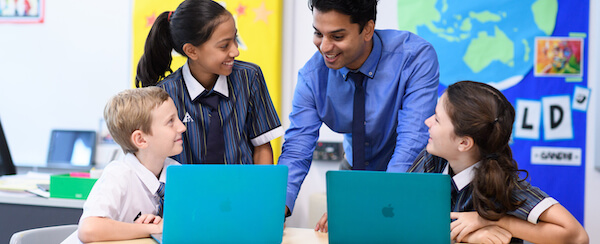Managing Screen Time During COVID-19
WRITTEN BY THE AIS WELLNESS TEAM, AUSTRALIAN INTERNATIONAL SCHOOL SINGAPORE
In these unusual times we are all spending more time on our devices: to access learning, to do our jobs or to connect with family and friends. For better or worse, this is our new normal. It remains important, however, that we manage our screen time, starting with the most important question: for what purpose are we actually using our screens?
The goal for our children is to prioritise screen time for meaningful engaging learning and social experiences, such as home-based learning, virtual play dates with friends and connecting with family.
It is easy to say that you will stick to a certain number of hours per day, or that you will trust your children to be more responsible with their daily screen time, but it is very challenging for children to self-manage their screen time. More often than not, there are disagreements leading to ongoing conflict around screen time. These can become a daily battle, underscored by intense emotions, that are not easily resolved. During COVID-19, screens and devices have become coveted sources of activity and distraction. At this time of higher stress levels and lower resilience, it’s also important to ‘choose your battles’: screen time doesn’t have to be one of them.
It is often much more effective to manage screen time through guided access apps from your phone, than risk the emotional rollercoaster of trying to reason an iPad out of the hands of a frustrated six-year-old. These apps can help to monitor your children’s screen time and access.
It is important to focus on what screen time is meant to accomplish. We want to prioritise engaging experiences over passive ones, such as the difference between playing a game with your classmates versus playing a game by yourself or watching a movie with your cousins versus watching a movie by yourself. The idea is to inspire a conversation about the shared experience, which will allow children to feel more connected. These engaging shared experiences will also offer opportunities for children to practise their observational, logical reasoning and conversational skills. These are links to board games and movie screenings that can be shared with friends and family:
- https://fossbytes.com/best-apps-watch-movies-together-online-with-friends/
- https://www.techradar.com/sg/how-to/how-to-play-board-games-online-play-with-friends-or-family-over-the-web
It is important to manage screen time so that it is not offered at the cost of the three pillars of mental health: sleep, nutrition and exercise. It is best to avoid screen time at least two to three hours before bedtime. Try to schedule recreational screen time as a reward for having completed other tasks throughout the day, including academic and learning tasks, as well as exercise.
To help strike balance , we can offer children activities rich in sensory input, such as arts and crafts, STEM, cooking, gardening, playing musical instruments and dance. Completing these activities offers opportunities to engage all five senses. Cooking and baking have the added bonus of the whole family enjoying the end result! Yoga, mindfulness meditation and breathing exercises, tailored for children, can also help engage the senses as part of a mindfulness practice, especially if completed as a family.
AIS’ Wellbeing Team reminds you that looking after ourselves and each other has never been more important. Among the many lessons we will learn from COVID-19 is the incredible strength we can draw from one another and the difference we can make as a community. We will learn that kindness, appreciation, connection and collaboration are crucial to our wellbeing and that together, with the right support, we will become stronger.






